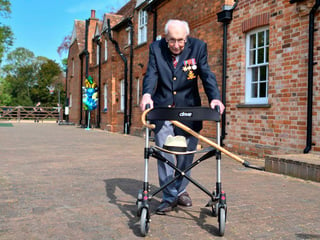What is pneumonia? Symptoms, treatments and what causes the infection that stopped Sir Tom Moore from having a Covid vaccine


Captain Sir Tom Moore became a national treasure during the first national lockdown when he raised more than £30 million for the NHS by walking 100 laps of his garden.
The West Yorkshire native, who was born in Keighley, inspired a nation amid the coronavirus pandemic and was knighted for his efforts by the Queen at Windsor Castle in July.
Advertisement
Hide AdAdvertisement
Hide AdIn the wake of his sad passing it emerged the inspiring Second World War veteran was being treated for pneumonia and tested positive for Covid-19 before he died, aged 100.
His family said that he was unable to have a Covid-19 vaccine due to the other medication he was receiving for pneumonia at the time.
What is pneumonia?
The NHS describes pneumonia as an "inflammation of the lungs, usually caused by an infection".
In a normal year pneumonia affects between five and 11 in every 1,000 adults and is more common in the autumn and winter seasons.
Advertisement
Hide AdAdvertisement
Hide AdPre-Covid statistics show that around 30,000 people in the UK die from pneumonia, according to the British Lung Foundation, though this figure is likely to change due to the pandemic.
In a 2018 newspaper interview, Dr Richard Russell, a consultant chest physician and medical director of the British Lung Foundation, said: "Pneumonia is a type of chest infection that affects the tiny air sacs in the lungs.
"When someone has pneumonia, these air sacs become inflamed and fill with fluid. This makes breathing harder and can leave patients very unwell. In some cases, it can be fatal.
"People who have lung disease are at an increased risk of flu which can sometimes lead to pneumonia."
What are symptoms of pneumonia?
Advertisement
Hide AdAdvertisement
Hide AdPneumonia symptoms can develop faster than other chest infections and include a dry cough, difficulty breathing and a rapid heartbeat.
A high temperature, sweating, shivering, loss of appetite and chest pains are also common symptoms to be aware of in cases of pneumonia.
Less common symptoms include coughing up blood, headaches, tiredness, feeling sick or being sick, wheezing, joint and muscle pain, feeling confused and disorientated.
What causes pneumonia?
The NHS states that pneumonia is usually a result of bacterial infection but symptoms can also be brought on in other ways.
Advertisement
Hide AdAdvertisement
Hide AdThese include viral pneumonia, caused by a virus such as Covid-19, aspiration pneumonia (breathing in harmful substance), fungal pneumonia (rare in the UK) and hospital-acquired pneumonia.
What treatments are there to fight pneumonia?
Mild cases of pneumonia can usually be treated at home by getting plenty of rest, taking antibiotics and drinking plenty of fluid.
At risk groups - such as young children, elderly adults, smokers, people with other health conditions and weakened immune systems - may need hospital treatment.
There are many ways to help stop pneumonia from developing and spreading such as covering your mouth when coughing or sneezing, and washing your hands regularly.
Advertisement
Hide AdAdvertisement
Hide AdSmoking and alcohol also weakens your lungs' natural defences against infections, so stopping or reducing these habits will reduce the chances of infection.
People at high risk of pneumonia should be offered the pneumococcal vaccine and flu vaccine.
